Peace talks will fail, predicts rebel leader
October 27, 2007 (PARIS) — Darfur peace talks due to begin today will fail and ultimately prolong the four-year conflict, the region’s most influential rebel leader has predicted on the eve of the UN-brokered talks.

“There can be no more sanctions on my people who have been raped or killed or had their houses burned down and driven into refugee camps,” Mr Nur told the Guardian in Paris, his home in exile for the past year. “Why is the international community putting pressure on the victim rather than putting pressure on the criminal regime? I am really confused. It is really very sad.”
Mr Nur, a 39-year-old former lawyer, objects to the choice of Libya as a venue, arguing that Muammar Gadafy is too close to Khartoum to be an honest broker. He also points to a long line of flouted ceasefires, and insists that any truce agreed in Sirte (expected in the first few days of the talks) without the presence of a muscular international force to enforce it, is worse than useless. “This will give the government legitimacy to kill people, to rape,” he said. “The process that is going on is not a real peace. It is prolonging the suffering of our people and complicating the problem of Darfur.”
A UN and African Union force of 20,000 troops and 6,000 police is supposed to move into position over the next few months but the deployment is being held up by the failure of any UN member country so far to contribute attack helicopters, and Khartoum’s refusal to accept non-African units. Without a significant mobile force, observers say it will be impossible to monitor a ceasefire. Another broad rebel coalition, the Justice and Equality Movement (JEM), and an important splinter group, SLA-Unity, also confirmed their intention not to attend the Sirte negotiations. Instead, mediators from the UN and AU are flying in representatives of some SLM and Jem splinter groups together with tribal elders, the heads of refugee groups and other civic groups.
Mr Nur’s absence may devalue the talks. Diplomats say he has lost the loyalty of some field commanders but accept that he retains the following of much of the province’s dominant Fur tribe.
Mediators hope if they can maintain the momentum of the talks, some of the absent rebels will be forced to join in or risk losing support. They also hope that the 2.5 million people in the refugee camps will tire of Mr Nur’s adamant stand.
“There is a feeling that his support is a mile wide but an inch deep,” one diplomat involved in the talks said.
Bernard Kouchner, the French foreign minister, said of Mr Nur recently: “What I fear, because I like Abdelwahid, is that the people around him will represent everyone and he will end up representing no one. I have told him that 10,000 times.”
The run-up to the talks has been a test of wills between the mediators and Mr Nur but he said he is not worried by attempts to peel away his supporters.
“Leadership will not be created in Libya or by the international community. Leadership is the recognition by the people, on the ground,” Mr Nur said. “I am not a criminal. I am not a saboteur of peace. Real peace will not be [made] in Libya and it will not be [made by] this process.”
Gordon Brown has much at stake in the talks as he made Darfur a priority on entering Downing Street and helped push through the UN resolution in July establishing the UN-AU force. The UK will be represented at Sirte by the UK special representative to Sudan, Michael O’Neill.
(The Guardian)
